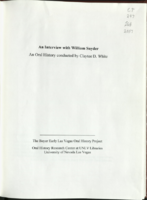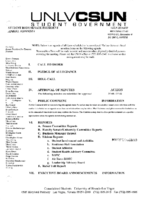Search the Special Collections and Archives Portal
Search Results

Transcript of interview with Shawn Willis by Barbara Tabach, May 5, 2017
Date
Archival Collection
Description
Shawn Willis (1972 - ) grew up in a culturally diverse area outside of Detroit, Michigan. She has made Las Vegas her home since 2004. Since moving to Nevada, she ?acknowledged? her Judaism and built a robust network within the Jewish community as an entrepreneur and tireless leader. From 2015 ? 2017, she held the position of Director of the Jewish National Fund of Las Vegas. The Jewish National Fund is a worldwide organization that was founded in 1901 to meet the strategic challenges of building in Israel and developing the infrastructure for ecology, special needs and heritage preservation. Among the local initiatives that Shawn led was a program on water conservation. In this oral history, Shawn candidly speaks of being a convert to Judaism. She also shares how she introduced herself into the Las Vegas community in a vibrant way through her marketing expertise and business. Shawn currently serves on the UNLV Foundation?s President?s Associates Council and is an active person in the Las Vegas community. Shawn is a graduate of University of Detroit Mercy.
Text

Transcript of interview with Karen Hayes by Robert F. Darling, March 2, 1980
Date
Archival Collection
Description
On March 2, 1980, collector Robert F. Darling interviewed state assemblywoman, Karen Hayes (born October 16th, 1935 in Cedar City, Utah) in her home in Las Vegas, Nevada. This interview covers her personal history, the history of Las Vegas, and the local political environment. The gaming industry is also discussed, in addition to the Sagebrush rebellion and future local political projections and trends.
Text

Transcript of interview with Bill Snyder by Claytee White, November 21, 2008
Date
Archival Collection
Description
In 1978 Bill Snyder came Las Vegas for a heavyweight championship fight between his homeboy, Larry Holmes and Ken Norton. During that visit, he saw cranes dotting the cityscape so he returned home and proposed that the family move across country and settle in the desert. His wife, Joy, gave him a year. And as they say, the rest is history. And what am amazing history it is. In this interview, Bill Snyder talks about his life from its beginning in Easton, Pennsylvania, where he discovered the challenge of architecture first by perusing books in the library and then by hands-on construction experience. But his love of art built the foundation to this treasured craft that has allowed him to design homes, office buildings, airport terminals and the McCaw School of Mines on the campus of McCaw Elementary School in Henderson, NV. The projects that Mr. Snyder seems to prize most are those that include the imagination of children. The people who shaped his life are introduced and the impact of his military training is wonderfully expressed. His connection with young people is paramount throughout the oral history that is beautifully documented with images of many of the projects that displayed children's art in an exciting way. Bill and Joy are the parents of two sons. Dana age 36, lives with his wife Christine in Hollywood, California, and works as a voice actor best known for his role as Master Shake on the cartoon Aqua Teen Hunger Force. Their younger son, Mike age 31, owns The Krate, a clothing, music, and art shop in Santa Cruz, California, where he lives with his wife Mandy and daughter Maya. A husband, father, sports car enthusiast, runner, thinker and lover of teaching and trusting young people, Bill Snyder is a brilliant architect and manager of people. He is dyslectic and never expected a school to be named in his honor but the William E. Snyder Elementary School was dedicated in 2001 with overwhelming community support. One of his current goals is to dream an architectural project that rivals the McCaw School of Mines for his own school. I trust that you will learn to love architecture in a different and very profound way as you read this interview just as I did during my conversation with Bill.
Text

Interview with Nick C. Aquilina, June 25, 2004
Date
Archival Collection
Description
Text

Meeting minutes for Consolidated Student Senate, University of Nevada, Las Vegas, April 26, 2004
Date
Archival Collection
Description
Text

Transcript of interview with Gertrude Greenblatt by Dario Gratini, March 1, 1981
Date
Archival Collection
Description
Interview with Gertrude Greenblatt by Dario Gratini on March 1, 1981. In this interview Greenblatt talks about arriving in Las Vegas in the 1940s, and the changes that took place place such as population growth, price increases, employment requirements, and recreation. She also talks about the changes in utilities and environmental issues.
Text

Meeting minutes for Consolidated Student Senate, University of Nevada, Las Vegas, December 04, 2006
Date
Archival Collection
Description
Text



